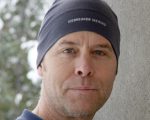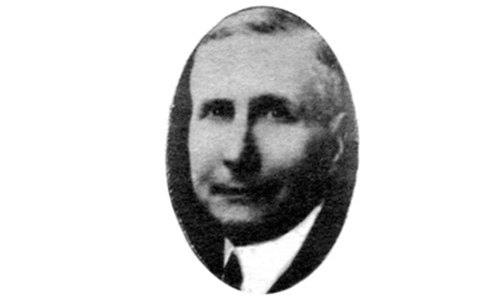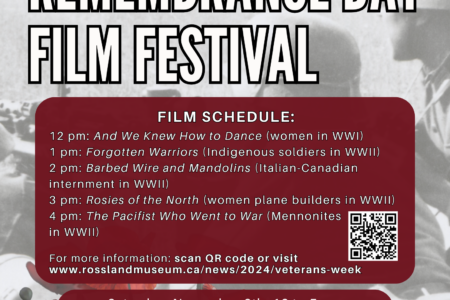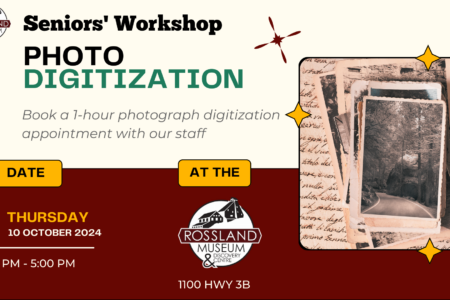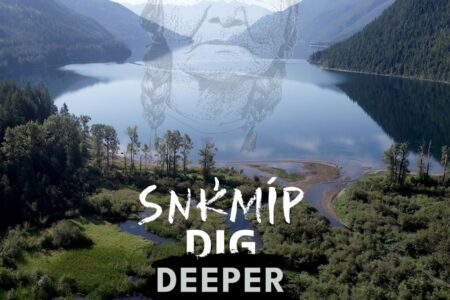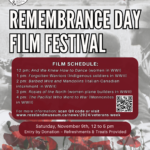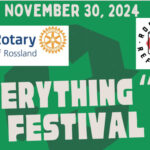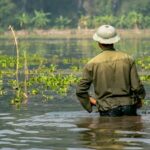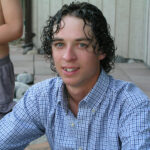TALES AND LEGENDS OF THE MOUNTAIN KINGDOM: Billy Esling
So, I grew up in lower Rossland, as many of you know, and I lived right below Esling Drive. We also had an Esling Park, where the cenotaph use to sit and where the Rossland seniors’ complex now exists. The question is, who was Esling, and why was he so important that Rossland landmarks named after him? Interestingly enough, there isn’t a lot written about the guy, but what I did find makes him out to be an interesting character. I’ve done my best to piece together what I can about him, and as I often do, I found he has some interesting connections to other famous Canadian people.
Billy Esling, or William Kemble Esling, was originally from Philadelphia. Born on February 19, 1868, he was educated at a local Philly boarding school called Girard College. Interestingly, this is the same school Russell Johnson graduated from. Who is Russell Johnson? Well, he played the professor on Gilligan’s Island. I am not kidding.
Esling emigrated to Canada in 1896, and I guess he did what a lot of Americans did at that time: he came west to try and make his mark. He seems to have had a journalistic streak, and he published the Rossland Record, the Mountain Kingdom’s first newspaper, from 1896 to 1899 (for more information on Rossland’s newspaper industry, check out this article). For reasons I cannot find, he gave up that paper, but was back in the biz in 1905 when he bought the Rossland Miner. He wound up selling the Miner in 1915 after 10 years at its helm because he began to go blind.
He was also an early supporter of food sustainability in Rossland and in an editorial in the Rossland Miner, is quoted as saying, “That apples, plums, pears, cherries, prunes and peaches, as well as the smaller fruits, can be grown in and about this city in large quantities and of superior quality has been demonstrated beyond a shadow of doubt. This assertion is proven by the results already attained by those who have small orchards in and around the city…There is just enough cold weather here in winter to give fruit a suitable flavour, while the summers are so warm and bright that it ripens to perfection…Those who desire to found comfortable self-supporting homes should immediately avail themselves of the opportunities that now exist for acquiring tracts of mountain land before it increases in value…Ten or twenty acres properly planted with fruit trees will give a man a competence within a few years.”
But what Billy Esling was perhaps best known for was his political career. He was first elected into office at the provincial level, winning the Rossland riding’s seat in the 1921 provincial election with 38% of the popular vote. He held that seat until 1924. During that time, he was key in helping get the Rossland-Cascade Highway underway.
Under the Conservative Party banner, Esling ran for federal office in 1925 in the riding of Kootenay West and won. He would hold that seat for nearly 20 years. He was noteworthy because he was the only blind parliamentarian during his tenure. And one of his caucus mates, and future Nobel Peace Prize winner, John Diefenbaker, remembered Billy well. Diefenbaker actually narrated a series of anecdotes about his life in office that was made into an LP, part of which you can listen to here. In it,the well-known PM remembers all kinds of people fondly, but the anecdote concerning Esling is particularly humourous.
In it, Diefenbaker states that Esling could recognize all of his fellow parliamentarians by voice, and that he was “loved by everybody.” Also, he “loved all mankind – but Doukhobours.” Indeed, Esling’s constituency did contain a large Doukhobour population, and during the time he was in federal office, the infamous Doukhobour protest group, the Sons of Freedom, were very active. Their activisim, protesting materialism and things of that nature, took on often violent forms, with bombs and arsons. But another thing they did, which really ticked off Billy Esling, was that they did protest marches in the buff. In his anecdote, Diefenbaker euphemizes this quite comically by referring to the nudists as “clad in their native raiment.”
But Billy, who was blind as a bat, was not amused by these birthday suit protests whatsoever. One day in the house, Billy brought this issue up. “It’s getting very serious, Billy Esling said,” narrates Diefenbaker in his anecdote, “that these women march about in this way to the discomfiture of our people.” (Note that men marched naked, too.)
The Prime Minister, who was William Lyon Mackenzie King, at the time, had a good chuckle. “The Prime Minister laughs?” Diefenbaker continues on, quoting Esling. “I ask him a question: what would he do some morning, if he were to arise at Kingsmere, and see half a dozen Doukhobor women, totally devoid of all raiment?” Diefenbaker says that King’s response was the only time that PM ever showed any sense of humour. “He said, I would immediately call in the leader of the opposition.”
At that time, R.B. Bennett was the Liberal leader of the Opposition, and he seemed to get into the swing of the moment by taking part in the witty repartee. As Diefenbaker related on the LP, “Bennett was indignant. He rose. He said, Mr. Speaker, the Right Honourable gentleman exaggerates. Dispensing patronage outside his own party has never been characteristic of him!”
Ha! Or, in the parlance of our times, LOL!
I’m not entirely sure when this exchange took place, but I can tell you that public nudity was criminalized, thanks in part to the Doukhobor protesters, and perhaps also thanks in part to Billy Esling, in 1932.
Billy Esling died December 2, 1946 at the age of 78. I don’t know how he died or where he is buried, but he would have seen a lot of changes in Rossland over his years here and would have been at the grass roots of a lot of initiatives there. Why there isn’t more out there about him I don’t know, but if anyone else has additional knowledge about William Kemble Esling, please say so in the comments!
Sources:
http://www.rosslandmuseum.ca/farmsgardens.html
http://en.wikipedia.org/wiki/William_Esling
John Diefenbaker’s LP, “I Am Canadian”: http://www.youtube.com/watch?v=pF85Nyftp1Q (the relevant anecdote starts at 11:24 or so)
http://en.wikipedia.org/wiki/Sons_of_Freedom_%28political_group%29
http://en.wikipedia.org/wiki/R._B._Bennett

